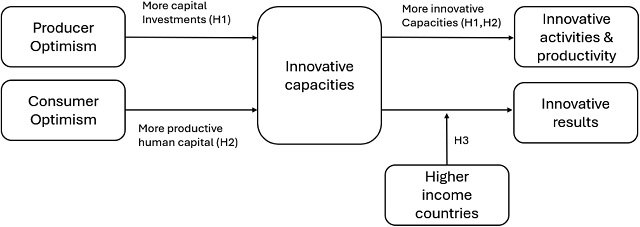
The relationship between optimism and innovation has long been a topic of interest in both psychology and economics. While studies have shown a positive link at the individual level, the impact of optimism on aggregate economic outcomes, particularly innovation, remains a subject of debate.
The study published in the Journal of Innovation & Knowledge by researchers from the University of Concepcion, Universidad Del Desarrollo, Macquarie University, and The University of Sydney explores the macroeconomic effects of economic optimism on innovation activity.
Key Findings
The study was based on an extensive analysis of 42 countries between 2000 and 2020. The sample included the 38 members of the Organisation for Economic Co-operation and Development (OECD) as well as Brazil, China, Russia, and South Africa.
The study’s results were:
- Optimism drives innovation activity: Economic optimism, measured by various indicators, is positively correlated with innovation activity. This suggests that a more optimistic environment can stimulate R&D efforts and investment in new technologies.
- No direct impact on innovation outcomes: While optimism fosters innovation activity, it does not directly lead to an increase in innovation outcomes, such as patent production. This indicates that while optimism can create a favorable environment for innovation, it is not a guaranteed path to success.
- The benefits of an optimistic environment: The study highlights that an economically optimistic environment can significantly contribute to a nation’s business ecosystem. By fostering a positive outlook and encouraging risk-taking, optimism can create fertile ground for innovation and economic growth. Considering each country’s income level, the study found that middle-income countries benefit more from an optimistic environment than high-income countries.
Researcher Dr. Danielle Kent stated that the study is the first of its kind to demonstrate a link between optimism and productivity at the macroeconomic level.
“Our research suggests that optimism is important in orchestrating a productive and innovative economic environment. Optimism leads to greater productivity and innovation in countries through increased investment and a more productive workforce,” said Dr. Kent.
Policy Implications
The findings of this research have significant implications for policymakers. By understanding the role of optimism in driving innovation, governments can implement policies that foster a more optimistic economic climate. These could include:
- Improving economic education: Educating the public on economic concepts and fostering a positive outlook on the future can contribute to a more optimistic environment.
- Encouraging entrepreneurship: Policies that support entrepreneurship and small businesses can help create a more dynamic and innovative economy.
- Investing in research and development: Government investment in R&D can provide the necessary resources for innovation and stimulate economic growth.
Conclusion
The study provides valuable insights into the intricate relationship between optimism and innovation at the macroeconomic level. Some key takeaways are:
- Producer optimism drives innovation: Business confidence plays a crucial role in stimulating innovation. Countries with higher levels of producer optimism tend to have more researchers dedicated to R&D and experience greater productivity growth.
- Limited impact of consumer optimism: While consumer confidence may indirectly influence innovation through its impact on business confidence, its direct effects on innovation outcomes are more limited.
- Optimism and innovation quality: The study suggests that optimism is associated with increased innovative activity but not necessarily with an increase in the quality or performance of innovations.
- Economic development and optimism: The benefits of economic optimism may diminish in higher-income countries, as these countries may have already reached a certain level of innovation and productivity.
“Optimism creates fertile ground for innovation by fostering increased R&D activity and boosting productivity, but the quality and quantity of outcomes may still depend on other factors,” stated Dr. Kent.
“Our research highlights the importance of creating a balanced environment where producer optimism is supported by other policies that encourage innovation, such as targeted R&D support, technological development, and entrepreneurship,” the researcher concluded.
The study was funded by the International Cotutelle Macquarie University Research Excellence Scholarship and the National Agency for Research and Development, Chile.
Contact
Danielle Kent
Department of Economics, Macquarie University
4 Eastern Road, North Ryde, NSW, 2109, Australia
Discipline of Finance, The University of Sydney Business School, The University of Sydney
Sydney, Australia
Email: danielle.kent@sydney.edu.au
Reference (open access)
Mahn, D., Wang, C., Kent, D., & Heaton, C. (2024). The optimism effect on country productivity and innovation activities. Journal of Innovation & Knowledge, 9(4), 100565. https://doi.org/10.1016/j.jik.2024.100565
Note: Written with information from the scientific article and the press release “Optimism fuels national productivity and innovation”.
Editor and founder of “Innovar o Morir” (‘Innovate or Die’). Milthon holds a Master’s degree in Science and Innovation Management from the Polytechnic University of Valencia, with postgraduate diplomas in Business Innovation (UPV) and Market-Oriented Innovation Management (UPCH-Universitat Leipzig). He has practical experience in innovation management, having led the Fisheries Innovation Unit of the National Program for Innovation in Fisheries and Aquaculture (PNIPA) and worked as a consultant on open innovation diagnostics and technology watch. He firmly believes in the power of innovation and creativity as drivers of change and development.





